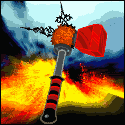|
Leperflesh posted:...there used to be solo adventure modules for D&D, which basically did that. When I bought my first D&D books from a kid who was getting rid of them - the red box, the blue box, and a few modules, plus the terrible old-school dice where you had to color the numbers in with a wax pencil and they turned into spheres after a short time - it included Ghost of Lion Castle, a solo adventure; you were instructed to, upon picking up a magic item or what have you, cross out the aforementioned magic item's listing in the book with a marker; if your dude died you were supposed to mark down all the stuff he had in the room he died in. That was, for years, the only actual play I had. It was awesome.
|
|
|
|

|
| # ? May 17, 2024 21:55 |
|
Dr. Tough posted:What makes you say that the popularity of TTRPGs has "plummeted"? D&D used to have full end cap displays at retailers like Toys-r-Us. Now it's primarily in the domain of specialty stores and online sellers with almost any big box store presence requiring companies to put together a small specialty product run.
|
|
|
|
It's interesting to me how products move from mainstream to purely a niche product. Like, comics used to be in the supermarket aisle, but then the 80s and 90s happened and comics shifted to only being marketed to comic book readers. Which, if you think about it, might be a hint why growth kind of faltered. I wonder sometimes which is cause and which is effect. Did the mainstream just move away from comics/RPGs and thus they had to focus on the core niche to survive; or did comics and RPGs abandon mainstream appeal to cater exclusively to the die-hard audience? What would happen if you tried to make a game that made no effort whatsoever to cater to any existing RPG audience, and instead focused on scooping up, say, the kids playing Skylanders. Ignore FLGS distribution, focus on getting into walmart and Toys R Us. It's probably not something any independent company has the resources to attempt, and no large company would be willing to take the risk, though.
|
|
|
|
ManMythLegend posted:D&D used to have full end cap displays at retailers like Toys-r-Us. Now it's primarily in the domain of specialty stores and online sellers with almost any big box store presence requiring companies to put together a small specialty product run. While this is true, it was mostly true during an era when D&D was like 90% of the TRPG market. That's not remotely true today. I bet something on the order of 10x as much revenue is made annually, after adjusting for inflation, by the whole of the TRPG market today than it was at the height of red box D&D's global popularity in the 80s. You don't see it in Toys R Us any more, but there are also a lot more nerd-type game stores, and there's Amazon, and D&D (and often several other games) are part of the normal stock at most bookstores too. It's just a much, much, much more fragmented market.
|
|
|
|
ManMythLegend posted:D&D used to have full end cap displays at retailers like Toys-r-Us. Now it's primarily in the domain of specialty stores and online sellers with almost any big box store presence requiring companies to put together a small specialty product run. Well in an era when "brick and mortar" stores are struggling and online retailers are growing I don't fine the move toward places like amazon that surprising.
|
|
|
JerryLee posted:My point is that making CRPGs "improvisational" in this sense is essentially just a technical/engine limitation and that those can be overcome as technologies and design philosophies advance. We may not ever be able to improvise in a CRPG with exactly the same ease as we can do so in a TTRPG but I fully expect them to converge until CRPGs can scratch that itch for most practical purposes. When we're at that point, they will no longer be games, but automated game studios that generate assets and dialogue and plotlines and so on as necessary. This is unlikely to ever be as popular as a designed vidcon, and making them good would require superintelligent AI, which is quite likely to be impossible to implement, apart from the ethical concerns.
|
|
|
|
|
Effectronica posted:When we're at that point, they will no longer be games, but automated game studios that generate assets and dialogue and plotlines and so on as necessary. This is unlikely to ever be as popular as a designed vidcon, and making them good would require superintelligent AI, which is quite likely to be impossible to implement, apart from the ethical concerns. 100% perfect would be impossible, sure. But it doesn't need to be perfect. Couldn't the problem largely be obviated through statistical methods, like in this dramatic/geographic/logistical situation 99% of players take action X, Y, or Z, so you just need content for paths A, B, and C? Then store that response indefinitely like a cache/hard drive combo. For the really obscure actions you could keep a stable of human devs filling in the cracks on-demand (with maybe a bit of autogen filler padding out gameplay until implementors reach you in the queue), and then save those results for future use as well. The idea being that you would code the automated stuff at a high level of abstraction so it could be reused as much as possible (ninjas attack you in a tower/ninjas attack you in a cavern/you attack the ninja hideout) with some variables to adjust to the current situation.
|
|
|
|
Decision trees get stupidly complex even when you only have three nodes per decision. But the truth is, as every GM with any experience knows, players are wildly unpredictable and three possibility-nodes do not remotely begin to cover what players will want to do in any given situation. You cannot script events for a sandbox, basically. Good sandbox computer games may have scripted events in them, but they tend to also have big open world with lots of randomly-generated content, and even then, they tend to feel very unreal and weird because of the static, artificial nature of a world that is mostly full of automatons who woodenly march back and forth in their designated patch of field, etc. Tabletop RPGs are improvisational. To make a computer game that feels the same, you need it to be operated by humans who have the power to improvise reactions to what unpredictable players do. See: Neil Stephenson's Diamond Age, in which "ractors" - paid, live human actors - perform NPC roles in a globalized MMORPG.
|
|
|
|
Leperflesh posted:While this is true, it was mostly true during an era when D&D was like 90% of the TRPG market. That's not remotely true today. Dr. Tough posted:Well in an era when "brick and mortar" stores are struggling and online retailers are growing I don't fine the move toward places like amazon that surprising. We can't simultaneously work under the tautologies that "TTRPGs are barely or nonprofitable for companies" and "the TTRPG has not declined since the golden age of D&D". Even if revenue is up across the industry when compared to the Red Box days my guess would be that you're seeing the same small group of people buying multiple games and products from multiple vendors rather then disparate demographics being drawn into the hobby by a new game that appeals to them. Additionally a not insignificant portion of any increased revenue is probably coming from people who got into the hobby as kids at the tail end of the TSR hayday, or the start of the WoD revival, becoming adults and having more discretionary income to spend on it. Granted the point about brick and mortar stores declining is accurate, but TTRPG's just don't have the cultural cache they used to independent of the shelf space dedicated to them. TTRPGs can't even generate controversy about being "satanic" or "bad for kids" anymore. Nobody cares enough to even complain about them.
|
|
|
Fuschia tude posted:100% perfect would be impossible, sure. But it doesn't need to be perfect. Couldn't the problem largely be obviated through statistical methods, like in this dramatic/geographic/logistical situation 99% of players take action X, Y, or Z, so you just need content for paths A, B, and C? Then store that response indefinitely like a cache/hard drive combo. For the really obscure actions you could keep a stable of human devs filling in the cracks on-demand (with maybe a bit of autogen filler padding out gameplay until implementors reach you in the queue), and then save those results for future use as well. The idea being that you would code the automated stuff at a high level of abstraction so it could be reused as much as possible (ninjas attack you in a tower/ninjas attack you in a cavern/you attack the ninja hideout) with some variables to adjust to the current situation. And eventually the map becomes the territory and this is no longer a game, but a reality of its own.
|
|
|
|
|
ManMythLegend posted:We can't simultaneously work under the tautologies that "TTRPGs are barely or nonprofitable for companies" and "the TTRPG has not declined since the golden age of D&D". I don't know about "barely or nonprofitable" but I wouldn't be surprised that gaming companies make smaller profits than in the 80's. Back then the hobby was dominated by just a few companies whereas now they seem to be innumerable. Also TTRPGs are insignificant because people aren't accusing them of being Satanic? What the hell are hell (no pun intended) are you on about?
|
|
|
|
Dr. Tough posted:I don't know about "barely or nonprofitable" but I wouldn't be surprised that gaming companies make smaller profits than in the 80's. Back then the hobby was dominated by just a few companies whereas now they seem to be innumerable. Also TTRPGs are insignificant because people aren't accusing them of being Satanic? What the hell are hell (no pun intended) are you on about? My point being that the moral panics associated with TTRPGs transitioned to video games because they rose to fill essentially the same cultural space that D&D used to.
|
|
|
|
ManMythLegend posted:We can't simultaneously work under the tautologies that "TTRPGs are barely or nonprofitable for companies" and "the TTRPG has not declined since the golden age of D&D". We absolutely can! Much more product is being sold at a much thinner margin. That satisfies both conditions. I'm not trying to be a nitpicky rear end in a top hat, either. RPGs have never been that profitable, but the volume problem of small publishing is fairly stark and hasn't actually changed that much; there is a fixed up-front cost to creating the content, and then there is a per-item cost for printed material. Sell less than X, you spent more than you made and you're at a loss. X is the profitability mark, where you made enough gross margins on your sold inventory to pay for the development costs. Sell 10,000 more copies, and you made a nice profit. Sell 100,000 more, and you have a revenue stream you can build a business on. When TSR was virtually unopposed, they could sell (made up numbers now) a million Red Box Basic D&D sets and own (say) 90% of the market, and be a company making lots of money and therefore able to spend it lavishly on experimental product lines, major advertising campaigns, etc. Now, supposed the biggest two fish in the pool - D&D and Pathfinder - are selling only 200,000 each of their flagship products. Together as juggernauts they own a whole 25% of the market. The market must therefore be bigger: it's a $1.6M market. But because each of them is selling way less volume on a per-company basis, none of the companies have the sorts of profits to sustain lots of experimental products, big advertising campaigns, etc. Again, those are made up numbers, just to illustrate the point: in a balkanized marketplace, the total market can be growing while every member of the market is struggling just to make ends meet. For RPG companies, this situation is not ideal. But for customers, it's great! Lots of variety. More, and better, RPGs than ever before. We also have new things like print-on-demand, which makes ultra-small-press and tiny "virtual" print runs practicable. There are hundreds of RPGs out there, and dozens more every year. We're drowning in choices. So when someone says "this is a golden age of RPGs" that's true, from the customers' perspective, even while someone else saying "everyone making RPGs are struggling, profits are almost nonexistent except for the top five companies, most people working for RPG companies do so for free or for peanuts" and that can also be true. Leperflesh fucked around with this message at 03:21 on Jun 26, 2015 |
|
|
|
How would you go about monetizing a largely digital TTRPG? I think that success in the future for TTRPG is going to be more about a successful long term business plan than about the actual rules of the game. Like lets say you have a core game book that introduces the game and how to play and then an app/website that acts as an updated reference.
|
|
|
|
Leperflesh posted:We absolutely can! Much more product is being sold at a much thinner margin. That satisfies both conditions. This still doesn't disprove my supposition that the increased revenue is a result of the same group of people buying more product and not more people buying into the hobby which is really "the problem" we've been talking about for the past few pages. I suppose if the goal is "the TTRPG hobby becomes profitable/more profitable" then there are two solutions, 1) a small amount of people buy a larger amount of product or 2) a larger amount of people buy a standard amount of product. Solution 1 means doubling down on existing hobbyists which is something that digitized rules, and selling niche games accomplishes, and is arguably what's happening now. However, that's not a good solution to the long term health if the hobby which requires a large influx of new customers which is solution 2. It doesn't how much you tinker with crunchiness, our how sweet your digital rules compendium and character builder are, unless you can convince little Johnny or Janey (or more appropriately who ever buys things for them) to choose a TTRPG over a AAA gaming title, the hobby is basically in stasis limping along on the backs of a few die hards.
|
|
|
|
Bucnasti posted:How would you go about monetizing a largely digital TTRPG? Frankly, if I could answer that question I wouldn't be posting about it here I would be out there trying to make money doing it.
|
|
|
|
Roleplaying games are hard to make profitable because each product serves multiple people while being purchased by one person, and is itself durable. This holds no matter how many people are in the hobby. Even if 50-60 million Americans were playing RPGs, you would still be selling a fraction of a book per player, and this gets worse when you consider the long term. In conclusion, capitalism must be destroyed.
|
|
|
|
|
Effectronica posted:Roleplaying games are hard to make profitable because each product serves multiple people while being purchased by one person, and is itself durable. Wouldn't the trick then be something like Warhammer Quest? Sell PC expansions with new dudes to play to players and new monster and adventure packs to gms? Or poo poo, design it with solitaire options so everyone basically tries to buy everything. Course stuff like marketing helps. Where the hell is a new DnD cartoon on tv? I'd watch the hell out of the Fell's Five IDW comic turned into a good cartoon. Or Dragonlance Chronicles. The early Drizzt stuff. Maybe some Ravenloft DVDs like the DC animated things just with less serial killer Harley running around in her panties. You gotta push stuff. I mean Hero Quest and Space Crusade did a bang up job for Games Workshop after all. But the comic analog is apt. poo poo gets more and more pricey, more and more aimed at an increasingly older nostalgia laden market who wants the same thing as they did when they were 12 just grimmer. Massive demand for increased production values and sold in fewer and fewer places to the point it's more or less just an IP mill. Except at least in comics you don't need 2-6 other people to enjoy them for x hours a month. And outside of GBS if you choose Japanese comics you get more for your dollar and no real Pundit types calling your chosen product form a great enemy Honestly not even aiming for the existing RPG crowd and market is where any comeback will happen. Quit with the ME TOO heartbreakers and get people who aren't playing now who might like to. Like maybe a Transformers RPG where the smaller sized figures are playing pieces so folks are buying the toys to either collect or play with. You want your PC to be a dinosaur? Well next figure wave is nothing but those give us all your money and watch the show on Cartoon Network! A good tie in videogame doesn't hurt either.... I still say the only reason Battletech is still around is because of the Mechwarrior games. It's mostly anecdotal but a lot of goons got into Warhammer 40k because Dawn of War hooked them. The problem is most of these companies couldn't probably afford an annoying boobie lady banner ad campaign, much less anything else. Captain Rufus fucked around with this message at 08:15 on Jun 26, 2015 |
|
|
|
Speaking on the subject of enhancing games with electronic stuff... I've been working on a system that helps track events in the background using a couple of player-done rolls, a very simple chart (if morale is this bad, these peple leave, and this guy tries to take over), and some location stuff (if the players helped these people, they're now doing this, if they didn't, this has now happened to them). It's basically designed to be relatively quick for the GM to figure out how things are going while giving the impression of depth and importance of player choices. I think I've done a good job of keeping it fairly simple, but it could also be done pretty well with an app, it occurs to me. GM punches in what's happened, and it tells him how things are progressing. That'd be good for managing multiple events/NPCs that the GM might otherwise lose track of. EDIT: You could also have custom inputs. "When two weeks have passed, remind me that the orcs are returning." "If NPC Farmer Rhubarb dies, his family is going to ask the party to help them leave the valley." Basically just a tracking program for GMs.
|
|
|
|
ManMythLegend posted:This still doesn't disprove my supposition that the increased revenue is a result of the same group of people buying more product and not more people buying into the hobby which is really "the problem" we've been talking about for the past few pages. No, it doesn't disprove it. But can you support the supposition that the total number of people playing RPGs is actually shrinking? I certainly don't get that impression from my FLGS, but that's just anecdotal. I do see parents of my own generation introducing RPGs to their kids. I see kids who have grown up with computer game RPGs having an instant sense of familiarity with many of the basic tropes that we had to learn from scratch: hit points, character levels, party mechanics, intraparty roles. I also will join with the others who have said that this: ManMythLegend posted:unless you can convince little Johnny or Janey (or more appropriately who ever buys things for them) to choose a TTRPG over a AAA gaming title, the hobby is basically in stasis limping along on the backs of a few die hards. ...is a false choice. LIttle Johnny or Janey buys the AAA gaming title, and then also plays tabletop roleplaying games. I sure as hell bought plenty of AAA computer game titles throughout my adolescence and adulthood, while also buying RPG stuff. And several other hobbies too. It's more a question of which hobbies kids dabble in vs. focus most of their leisure time on, and whether RPGs can survive in an environment where kids dabble more than they go deep. I also see evidence of a large market that isn't being captured by the FLGS. Kickstarter finds thousands of people with millions of dollars to back miniatures-based board games, miniatures-only kickstarters like Reaper Bones (whose product lines are specifically aimed at tabletop RPGers, including a licensed Pathfinder product line), and lots of RPG kickstarters. I really do feel like there hasn't been that big of a downturn in the total number of people playing. Just, they're maybe less willing to spend hundreds of dollars on dozens of books for a specific game; they're looking for more virtual play options, using virtual tabletop products like roll20, playing play-by-post games on forums, and trying out related nerdgame genres like tabletop wargames, CCGs, LCGs, etc. I just keep coming back to that. How do we know this isn't a golden age for RPGs? Has anyone even attempted to publish industry-wide sales figures, which capture all formats and delivery mechanisms, including Amazon, print-and-play, digital/PDF offerings, as well as brick-and-morter FLGS sales?
|
|
|
|
Effectronica posted:When we're at that point, they will no longer be games, but automated game studios that generate assets and dialogue and plotlines and so on as necessary. This is unlikely to ever be as popular as a designed vidcon, and making them good would require superintelligent AI, which is quite likely to be impossible to implement, apart from the ethical concerns. More importantly, that still wouldn't be a roleplaying game or fun for the same reasons that roleplaying games are fun, because you play roleplaying games with other people.
|
|
|
|
Effectronica posted:When we're at that point, they will no longer be games, but automated game studios that generate assets and dialogue and plotlines and so on as necessary. This is unlikely to ever be as popular as a designed vidcon, and making them good would require superintelligent AI, which is quite likely to be impossible to implement, apart from the ethical concerns. Why are you assuming that the role of the GM will be taken over by an AI and not by a human? "An automated game studio that generates assets on the fly as necessary to drive the plot that the group wants to pursue" is exactly the kind of thing that NWN and (to a lesser degree) Sword Coast Adventures is aiming for.
|
|
|
|
Speaking for one sample, my university RPG society has been running since 1977 with a steadily growing membership. Looking back at the records, approximately twice as many new students are joining each year now than 10 years ago, and even more than that for 20 years ago. Maybe we've got better at marketing, but I think the general penetration of geek ideas and the social acceptability of neediness may have made people more likely to jump in and give it a shot. An additional factor might be that we focus on larp rather than tabletops (something like Megagames if you've seen them but spread over 8-16 sessions), providing something you really can't get elsewhere.
|
|
|
|
Leperflesh posted:No, it doesn't disprove it. But can you support the supposition that the total number of people playing RPGs is actually shrinking? I can't, but I was responding to a assumption on your part that revenues had actually increased for TTRPGs which we don't have any data for either. Everyone's basis for discussion is anecdotal because we're taking about an industry that publishes no financial data and a hobby that no one has really surveyed. In this particular case my anecdotal evidence is different from yours. I've watched FLGSs fold or reorganize to cater to a certain hard core niche. The only successful one I've seen got out of the TTRPG market completely and now survives on MtG and board games alone. Leperflesh posted:I also will join with the others who have said that this: You're proving my point. TTRPG's represent, for the initial purchaser of the group, a commitment of as much or more money as buying a AAA game. In general it also requires a much more precise set of circumstances to actually play (a place where you won't be bothered, friends with the same work/school/ECA schedule, etc) and much more time to sustain as opposed to a video game where the ease of access is low and constant. Why would a kid go for that, especially if it's unclear that their immediate friend group would want to actually play it long enough to feel they got their money's worth? Is it possible to buy TTRPGs and AAA video games? Absolutely. Is a child, or someone who is buying games for a child, that is not already a part of the TTRPG hobby going to pick the rulebook and dice over the next Elder Scrolls game? Probably not, and that's a huge problem if you're trying to expand your hobby's player base. Leperflesh posted:I also see evidence of a large market that isn't being captured by the FLGS. Kickstarter finds thousands of people with millions of dollars to back miniatures-based board games, miniatures-only kickstarters like Reaper Bones (whose product lines are specifically aimed at tabletop RPGers, including a licensed Pathfinder product line), and lots of RPG kickstarters. I think Kickstarter is actually a perfect example of what I'm talking about. If you look the backers in the Tabletop section there is a lot of overlap. The same groups of people are continually throwing down hundreds of bucks for slightly different zombie minis, or the next storygame heartbreaker, or pathfinder supplement, or whatever. Kickstarter is not expanding the player base, it's further monetizing the existing one. Leperflesh posted:I just keep coming back to that. How do we know this isn't a golden age for RPGs? Has anyone even attempted to publish industry-wide sales figures, which capture all formats and delivery mechanisms, including Amazon, print-and-play, digital/PDF offerings, as well as brick-and-morter FLGS sales? We don't because no one has, or if they have they haven't released the data publicly. Until someone does the best we can do is watch the industry and imply from there. Based on the fact that the major companies are pandering to the worst, but most hard core, portion of our hobby leads me to believe they are trying to ensure that they keep buying books rather then trying new things to pull in lots of new kids.
|
|
|
Ferrinus posted:More importantly, that still wouldn't be a roleplaying game or fun for the same reasons that roleplaying games are fun, because you play roleplaying games with other people. Yeah. gradenko_2000 posted:Why are you assuming that the role of the GM will be taken over by an AI and not by a human? "An automated game studio that generates assets on the fly as necessary to drive the plot that the group wants to pursue" is exactly the kind of thing that NWN and (to a lesser degree) Sword Coast Adventures is aiming for. Okay. Let me use Fallout: New Vegas as an example again. Within the context of the game, it is entirely reasonable that, if I wanted to build and launch a rocket to the moon, I could, using the resources reasonably available to a late-game player. However, I can't, most specifically because there are no assets or programming related to space travel in the game. So this would require an entirely new set of assets, and indeed a reprogramming of the game, in order to implement. Furthermore, procedurally generated dialogue is incapable of achieving the level of the real thing, so you need someone to write all the associated dialogue, and determine what I can do when I get to the moon, creating the necessary quests and characters. And you need to be able to do this essentially in real time. So you require superhuman capabilities in order to do this (that is, a superintelligent AI), or an entire simulated world, which brings its own problems. By contrast, if we were playing Fallout tabletop, or whatever, flying a rocket to the moon can be improvised in real-time, with maybe one or two breaks to accommodate the need to figure out what's on the moon to interact with. There's no actual need to create new assets, and the process of creating the optional assets is much simpler than doing so for a video game. There's also no need to reprogram, only an option to add microgravity rules. The dialogue is being improvised by an intelligent being who knows the characters enough (in theory) to be able to do so convincingly. ManMythLegend posted:You're proving my point. TTRPG's represent, for the initial purchaser of the group, a commitment of as much or more money as buying a AAA game. In general it also requires a much more precise set of circumstances to actually play (a place where you won't be bothered, friends with the same work/school/ECA schedule, etc) and much more time to sustain as opposed to a video game where the ease of access is low and constant. Why would a kid go for that, especially if it's unclear that their immediate friend group would want to actually play it long enough to feel they got their money's worth? Solitaire represents an even easier set of circumstances to play! Why don't kids just play solitaire instead of anything else? This is a stupid question. quote:We don't because no one has, or if they have they haven't released the data publicly. Until someone does the best we can do is watch the industry and imply from there. Why are we assuming that corporate entities are unbound by material conditions, or that they instinctively know the best way to go? This is a very historically ignorant assumption.
|
|
|
|
|
Bucnasti posted:How would you go about monetizing a largely digital TTRPG? I think that success in the future for TTRPG is going to be more about a successful long term business plan than about the actual rules of the game. You sell the high margin implementations of those rules to the actual players directly by making them more convenient to use. Web/app based character builder that supports being used as a sheet in play. All the arguments for "oh this one book lets everyone in my group play" also applied to CDs in the not so distant past. People switched to MP3s and streaming services because they're more convenient, allow them to get the exact stuff that they want, and are easier to have with you without a ton of extra baggage. Again look at how successful DriveThruRPG has been. I think that to really see the type of breakout success that the old BECMI box had though you need to give it some solo content that gives people a reason to grab your app and try it out on their own. People keep talking about how D&D used to be sold at Toys'R'Us but the App Store is where you'd actually want to get into now. Even most of the big name board games come out with an app because there's way more profit to be made digitally then in toy stores. EDIT: Does anyone remember that D&D Facebook app? It seemed to be pretty successful, real shame they didn't have a way for it to spit you out a character to run an adventure with.
|
|
|
|
Effectronica posted:Okay. Let me use Fallout: New Vegas as an example again. Within the context of the game, it is entirely reasonable that, if I wanted to build and launch a rocket to the moon, I could, using the resources reasonably available to a late-game player. However, I can't, most specifically because there are no assets or programming related to space travel in the game. So this would require an entirely new set of assets, and indeed a reprogramming of the game, in order to implement. And, crucially, the reason you might fly a rocket to the moon in a tabletop game based on the Fallout setting is that you've gotten a group of your friends to agree with you that it's possible, and imagine with you that it's happened, and share with you the experience of extrapolating and negotiating consequences from it. Like, in many ways, the degree of player choice you have in a tabletop roleplaying game is much less than that which you'd have in a comparable video game - owing to constraints of character and narrative and such, I can't just roam arbitrarily about the map of my D&D game the same way I could roam arbitrarily about the map of Skyrim, and your Fallout DM might well just veto your rocket to the moon plan through via either in character or out of character reasoning - but that doesn't matter, because it's not even the range of potential activity that truly separates collective tabletop gaming from MMOing or whatever. They're just totally different experiences, and I do not achieve from playing TTRPGs the same kind of satisfaction that I derive from playing video games, whether single player or multiplayer.
|
|
|
|
ManMythLegend posted:Is it possible to buy TTRPGs and AAA video games? Absolutely. Is a child, or someone who is buying games for a child, that is not already a part of the TTRPG hobby going to pick the rulebook and dice over the next Elder Scrolls game? Probably not, and that's a huge problem if you're trying to expand your hobby's player base. Do you imagine that video games are new? At the height of Red Box D&D's popularity (it was released in 1983), when it was being sold in Sears and Toys R Us, there were premium video games and consoles. Kids were playing Mario Bros. and Spy Hunter and Ultima III. (see https://en.wikipedia.org/wiki/1983_in_video_gaming). I know those games seem simple to us now, but at the time, they were HUGE. I was there! And they were just as expensive, too. If video games weren't an obstacle to the original explosion of tabletop RPGs in the 1980s, then they aren't now. e. We're having this disagreement, I think, because you're starting from the conclusion that "RPGs have become very niche and nobody who doesn't already play RPGs is interested" and I'm saying that's not a justifiable position, given the lack of evidence. You can point out that I can't prove that the RPG hobby is actually expanding or bigger than it was, say, ten years ago, and that's true too: but I'm not trying to prove that case, I'm only trying to show that it could be true, and therefore, it's not justified to claim that RPGs are in a decline. Either one of us can invent a narrative to rationalize either conclusion, but that's all. Leperflesh fucked around with this message at 16:55 on Jun 26, 2015 |
|
|
|
Misandu posted:Not that I've seen. From everything I've read it seems like it boils down to the margins not being enough to actually afford the sort of professional work that it would take, which is why I think if you want to make money in this hobby you've got to largely abandon the "book that has everything you need" model in favor of something more friendly to beginners. There's no doubt in my mind that we won't see another big success story until someone puts out a moderately priced starter set that includes a short introductory campaign and some characters and then directs you to an app that lets you buy the content you're actually going to use. I'm talking something like the old offline Character Builder where you can play premade characters or make your own low level guy, except then for a $1 you can buy access to new content. Flavivirus posted:Don't AW-derived games fulfill this, at least those whose playbooks are free to download? You can essentially grab everything you need to play for free, then buy the book to get advice on setting up and running a game, explanations of how moves work and ideas for creating your own content. Dr. Tough posted:Again, I just don't understand why there needs to be special rules for this. The rules for this are already there: it's called playing the game. If the PC's stopped the cultists from killing the king then the result is that the king is still alive and any cultists that the PCs killed are not. You don't need to roll on a table for that.
|
|
|
|
Halloween Jack posted:Even as someone who has played extensively, I wouldn't want to try to pick up AW using just the playbooks and basic reference sheets. Oh certainly, I meant a heavily emphasis on need as in bare minimum. Maybe something like Lady Blackbird is a better example?
|
|
|
|
Halloween Jack posted:Maybe I'm just nerdy or old-fashioned, but personally I despise content platforms where you basically pay for a demo and are then confronted with a bunch of locked doors to more content. Maybe it's just because the quality of similar attempts in RPGs has often been pretty poor; for example, I don't think the 4e Red Box was well-received. I also hate tutorial levels in video games and guided tours through museums. When I started playing RPGs I bought the 3.0 starter box and had a good time with it. I bet if I had bought either 4th Edition Starter Box I'd have had just as good a time with it. The currently available starter products are and have been fine at getting new players who are actively interested in learning how to play into the games, it's just that they aren't being provided in the ways and places that younger more tech savvy players are going to find them. When I type "Dungeons and Dragons" into the App Store there should be something (ideally free) that lets me run a starter adventure for my friends off of our devices.
|
|
|
|
Halloween Jack posted:Games like REIGN, for example, have rules for the strength of nations and organizations, in a way that goes beyond the stronghold-building rules from D&D. So after smashing the cult and saving the king, you can see that the safety and economy of the kingdom has measurably improved because you did that. Thing I've been doing for my project is dividing the environment up by location. Each location has a list of conditions and a timeline. Like, there's a cave full of kobolds that have kidnapped a kid to serve as their winter prince (with the intention to sacrifice him to bring back the sun). If you get there the first week, the kid is scared and ready to go home. If you get there the fourth week, he's gotten used to being pampered and doesn't want to go. By week ten he's gone. Week fourteen, and the kobolds are attacked by orcs. Rescuing the kid or recruiting the kobolds (ideally both) will give a slightly different timeline. Or another location might reference bandits the players might have encountered. If they routed them, they might be set up in the new location. The idea is that the GM will be able to quickly pick out what the scenario is based on what the party's done so far. I've tried to make it as easy as possible for the GM, but I can see how having an app to track this sort of thing would be even easier.
|
|
|
|
You know what here's an even better reason to have something on the App Store. When I type in Dungeons and Dragons I get a bunch of third party apps that are making money by showing up on that search, and it's mostly dice rollers and character apps. Why let your brand serve as a free ride for those developers instead of cashing in yourself with AT LEAST some basic tools.
|
|
|
|
I can understand why WotC can't make a Dungeons and Dragons movie, but why hasn't it tried to circumvent their old contract with like Wizard of the Coast presents Forgotten Realms the Movie? Is the settings so tied to the D&D brand they can't attempt something simple like that?
|
|
|
|
Name recognition, mostly. Forgotten Realms is recognized by gamers, but doesn't have a lot of cachet outside the hobby, whereas pretty much everyone (at least in the US) has heard of Dungeons and Dragons. They might not be able to find a studio willing to risk the investment on a large budget production without the name Dungeons and Dragons to help sell it. This doesn't preclude smaller-scale productions like animated movies, but they already gave that a go with an animated Dragonlance movie in 2008 which did not do terribly well (animation was pretty bad and they tried to squeeze too much of the novel into the movie). We'll see if they ever decide to try again, perhaps with a more competent animation studio.
|
|
|
|
I was at a local Barnes & Noble yesterday, and the D&D aisle has shrunk from a full rack + endcap down to 1.5 shelves. It's now cohabiting a space with videogame strategy guides. As much as it seems anecdotal, shelf planning is never a one-off thing. Is this happening at any other big retailers?
|
|
|
|
moths posted:I was at a local Barnes & Noble yesterday, and the D&D aisle has shrunk from a full rack + endcap down to 1.5 shelves. It's now cohabiting a space with videogame strategy guides. At my B&N, it's always been like that. 1 shelf with top half being video game guides and bottom half being DnD + other rpgs (usually FFG).
|
|
|
|
I've heard stories of parents/players picking up D&D games from toy stores: when did the industry shift to books being sold at bookstores?
|
|
|
|
The toy store era was really just a tiny slice of the 1980s. Before that it was hobby stores only (heck, in my area you could buy D&D supplements in the same store as your baseball cards), after that it was hobby stores and bookstores. As the bookstore has disappeared, RPGs have clung to the hobby store.
|
|
|
|

|
| # ? May 17, 2024 21:55 |
|
JDCorley posted:The toy store era was really just a tiny slice of the 1980s. Before that it was hobby stores only (heck, in my area you could buy D&D supplements in the same store as your baseball cards), after that it was hobby stores and bookstores. As the bookstore has disappeared, RPGs have clung to the hobby store. This was actually a topic of discussion at a local convention last year. The thing is, roleplaying games present some kind of a conundrum for retailers, because at the same time it's a game but it's also a book. To a person who has no idea about roleplaying games, it's really confusing. The Red Box could be easily sold at toy stores because it was in a box, meaning that to the outsider it was virtually indistinguishable from board games that also come in boxes, and I'm sure most toy stores to this day carry board games. In aforementioned discussion, Finnish RPG designer Mike Pohjola said that this was the very reason he made his game, Heroes of the Storm, a boxed set: the game's very purpose is to act as an entry-level product for kids who have no idea about RPGs, and it being in a box means it can be easily sold in book and toy stores alongside all the other board games. At least here in Finland you can't find RPGs outside of specialized stores. Not even D&D. Heroes of the Storm is the one exception to the rule, and it can be easily found in almost any book or toy store here.
|
|
|





















